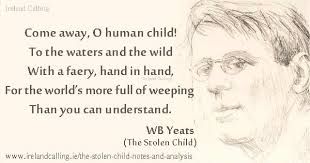
Leaders are often encouraged to be selfless, to be servant leaders (and other such descriptors).
However, our egos are very stubborn. They resist the idea of being selfless, as that means dissolving the ego so as to be of greater service to others, to shift and transform from one state to another.
It is very hard to “think your away” from one state to another, to get “out of your head”. In order to do so, shift from thinking to feeling, create an experience for yourself that is out of your norm.
That can be a walk on the beach, meditation, exercise. It can also be listening to music, dancing, even whirling and spinning as dervishes do for just such a purpose.
I love music and poetry, and the combination for me can be powerful. An absolute gem is “The Stolen Child” by Yeats, put to music by The Waterboys, from the Fisherman’s Blues album recorded in Ireland, and featuring the incredible voice of Tomás Mac Eoin, a local singer of Sean-nós unaccompanied singing.
The poem is of faeries beguiling a child to leave with them, yet as the voices and accompaniment wash over you, only the simplest understanding of the poem are needed for you to be lost in it.
I was reminded of this song last week. It truly dissolves me, it is so ethereal, so other-worldly. Such experiences allow me to come back to this world with heightened senses and lowered ego.
What do you do to enable you to be in that selfless leadership space?
The Waterboys, then the full poem.
https://youtu.be/vOzbqY1ABwQ
The Stolen Child
W. B. Yeats, 1865 – 1939
Where dips the rocky highland
Of Sleuth Wood in the lake,
There lies a leafy island
Where flapping herons wake
The drowsy water rats;
There we’ve hid our faery vats,
Full of berrys
And of reddest stolen cherries.
Come away, O human child!
To the waters and the wild
With a faery, hand in hand,
For the world’s more full of weeping than you can understand.
Where the wave of moonlight glosses
The dim gray sands with light,
Far off by furthest Rosses
We foot it all the night,
Weaving olden dances
Mingling hands and mingling glances
Till the moon has taken flight;
To and fro we leap
And chase the frothy bubbles,
While the world is full of troubles
And anxious in its sleep.
Come away, O human child!
To the waters and the wild
With a faery, hand in hand,
For the world’s more full of weeping than you can understand.
Where the wandering water gushes
From the hills above Glen-Car,
In pools among the rushes
That scarce could bathe a star,
We seek for slumbering trout
And whispering in their ears
Give them unquiet dreams;
Leaning softly out
From ferns that drop their tears
Over the young streams.
Come away, O human child!
To the waters and the wild
With a faery, hand in hand,
For the world’s more full of weeping than you can understand.
Away with us he’s going,
The solemn-eyed:
He’ll hear no more the lowing
Of the calves on the warm hillside
Or the kettle on the hob
Sing peace into his breast,
Or see the brown mice bob
Round and round the oatmeal chest.
For he comes, the human child,
To the waters and the wild
With a faery, hand in hand,
For the world’s more full of weeping than he can understand.
